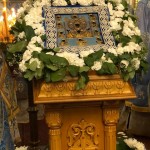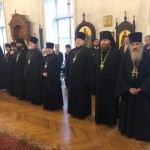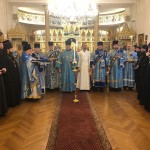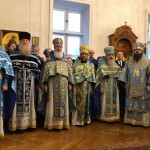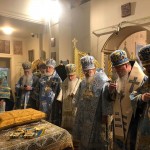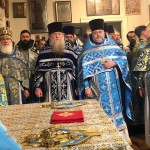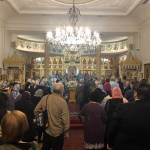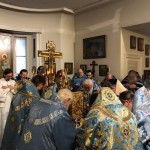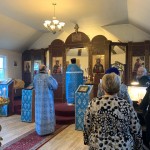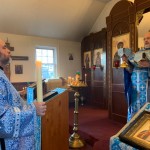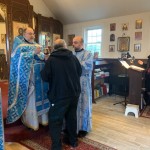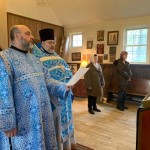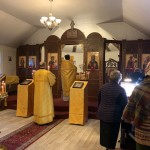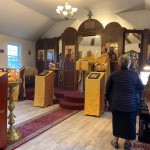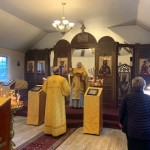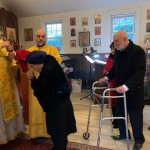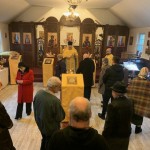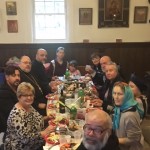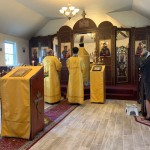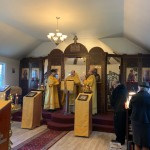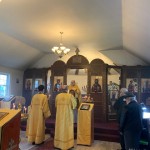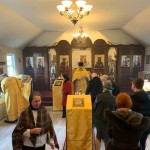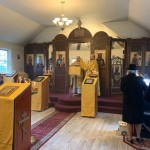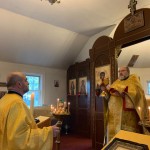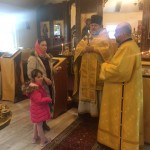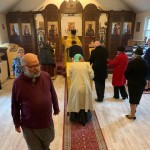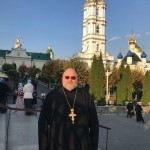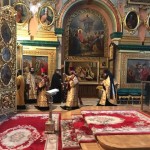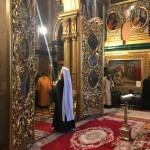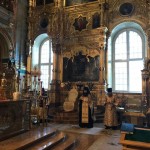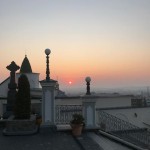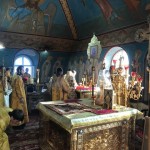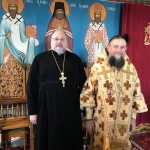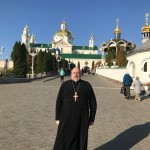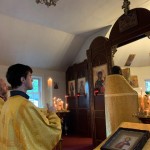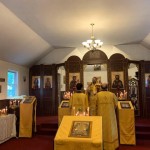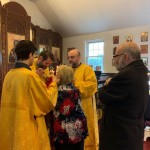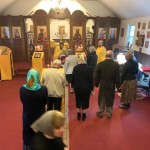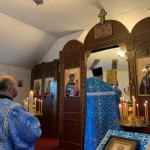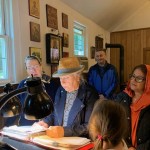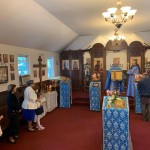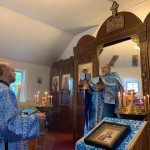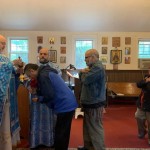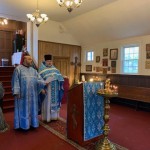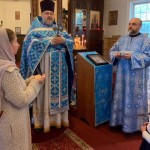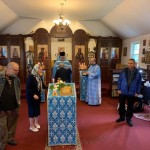On November 24, on the 23rd Sunday after Pentecost, the Rector of St. George Church, Archpriest Igor Tarasov served the Divine Liturgy at our parish temple. Following the Gospel lesson he preached the following homily in Russian:
«Дорогие во Христе братия и сестры! Сегодня св. Евангелие рассказывает нам притчу о добром самарянине. Эта известная притча говорит нам о новом учении, которое Господь наш Иисус Христос принес в мір. Это учение не отрицало ветхозаветного Закона и Пророков. Наоборот, в сегоднешнем евангельском чтении Христос ссылается на Закон Моисея, когда разговаривает с иудейским законоучителем. Но наш Спаситель пожелал внести в этот закон новый новое начало. Он проповедовал, что все законы и правила должны подчиняться самому высшему закону – закону любви. Именно поэтому Господь учит, что любовь превосходит все и не знает пределов.»
«В сегодняшней притче мы видим, что любовь к собрату по человечеству должна возвышаться над любыми национальными, религиозными и общественными различиями. Она не должна знать границ. Человек попался разбойникам и лежал на дороге едва живой. Предположительно, это был иудей. Он не получил помощи от высших и уважаемых представителей иудейского общества – от священника и левита, которые проходили по той дороге мимо него. Но самарянин, чужой для иудеев человек, сжалился над ним и позаботился о раненом человеке (Лк. 10, 30-35).»
«Иудеи и самаряне враждовали между собой, обвиняя друг друга в неверном почитании единого Бога. Так как самаряне были потомками и евреев и различных других народов Востока, переселенных в Святую Землю, иудеи не считали их своими и смотрели почти как на язычников. Они обвиняли самарян в служении языческим богам одновременно с почитанием единого Бога. Самаряне же считали себя, а не иудеев «истинными израильтянами». Таким образом, и во времена Спасителя на Святой Земле существовала вражда. Поэтому притча о добром самарянине, рассказанная Христом, должна была звучать очень злободневно. Переводя ее на современную обстановку в Святой Земле, можно представить, что еврея ограбили, избили и оставили лежать на улице. И вот ни один уважаемый еврей не оказывает ему помощи, но проходит мимо. И только какой-то араб видит его и проявляет милосердие.»
«Именно это говорит нам о том, что хотел сказать Господь иудейскому законоучителю: то, что нашим ближним является любой человек в нужде, даже тот, кого мы считаем врагом. Потому, что мы все – люди, и потому, что все мы сотворены по образу и подобию бесконечного Бога, все мы, бесконечное количество разных людей, являемся ближними друг другу. Мы все должны друг друга любить.»
«К сожалению, по причине греха и испорченности человечества мы разделены по множеству признаков: по расам, национальностям, происхождению, вере, политическим убеждениям и по многим другим причинам. Такое разделение неизбежно в этом состоянии греховности. Сам Господь Бог не благословил бы однородности, единообразия такого человечества – грешного и гордого. Св. Писание говорит, что в древние времена Бог смешал человеческие языки, когда люди намеревались построить Вавилонскую башню, то есть достичь мірового господства без Божия благословения. Подобно этому и в наше время люди пытаются построить мировое сообщество, глобальную цивилизацию. Но если такое сообщество они будут строить без веры в Творца и не опираясь на традиционные нравственные принципы, Господь не благословит их намерение, и оно не будет иметь успеха. Но вместо создания безбожного единства людей основанного на гордости и низменных инстинктах, Господь наш Иисус Христос предлагает нам единство основанное на любви и осознании нашего несовершенства. Это единство в проявлении милосердия по отношению ко всем нуждающимся, несмотря на то, белая или темная у них кожа, нашей национальности они или нет, из нашей ли страны или издалека. Мы призваны любить нашего ближнего, и таким ближним может быть каждый, кто нуждается в нашей помощи, нашей заботе, нашей жалости и милосердии.»
«Поэтому если мы говорим о том, что нужно единство людей, это не означает, что нужно всех объединить в нечто одно, привести к единому знаменателю или расчесать под одну гребенку.
В последние десятилетия многие православные люди не жалуют движение так наз. экуменизма, которое заключается в том, чтобы стремиться к объединению всех христиан. Но разве можно соединиться православным с еретиками? Сам Господь не велит этому случиться. Но Господь желает, чтобы мы, будучи православными, все-таки любили и представителей иных церквей и религий. Мы должны понимать, что они в чем-то заблуждаются, но не презирать их. А главное – если они нуждаются в помощи, мы должны им помочь, проявить любовь.»
«В то же время мы должны понимать, что наша человеческая природа немощна и уязвлена грехом, и поэтому мы ничего благого не в состоянии совершить по-настоящему без Божией помощи. И потому символически «Добрый Самарянин» – это Сам Господь наш Иисус Христос, Который пришел помочь человечеству. Господь видел, что человеческий род подвергся страшному злодеянию, подобно тому как подвергся нападению разбойников несчастный человек из притчи. Диавол прельстил человека, обокрав его, отобрав у него райское блаженство. Он снял с него одежду чистоты. Диавол избил, изранил человека, уязвив его душу грехом, а тело сделав подверженным болезни и смерти. Человек лежал едва живой в духовном отношении пока не пришел Божественный Спаситель. Но помощь подоспела. Сын Божий спас поверженное человечество.»
«Поэтому, дорогие во Христе братия и сестры, давайте стремиться проявлять на нашем жизненном пути любовь к ближнему. Во время своего путешествия по жизни мы много раз можем встретить людей, нуждающихся в нашей помощи. Эти люди могут быть кем угодно, даже порой нашими врагами. Однако помним завет Христов любить и их. Помним и притчу о добром самарянине, пришедшем на помощь иудею. И помним, что все люди в беде – наши ближние. Наше призвание быть милосердными и добрыми во имя Господне и под святым покровом Церкви Христовой, нашей врачебницы, в которой мы исцеляемся, чтобы продолжить наш путь к Господу Богу.»
During the Litany of Fervent Supplication the Rector proclaimed the petition of thanksgiving.
During preparation for Holy Communion the choir nicely performed hymns dedicated to Venerable Theodore Studite, a Saint commemorated on that day, as well as a hymn in honor of the Most Holy Theotokos.
Following the Liturgy dismissal the Rector preached a short sermon in English conveying the ideas of his Russian homily. He also reminded the parishioners of the beginning of the Nativity Fast which starts next week. This year its beginning falls on the Thanksgiving Day, so devout Orthodox Christians should not fully celebrate that holiday. However, we may do it before, so the Rector invited everybody to our parish Thanksgiving luncheon after the service.
Thus soon after the Liturgy the Rector and parishioners enjoyed delicious meals, including the Thanksgiving turkey. The toasts were raised to our parish well-being, as well as to our choir and to Fr. Igor.

